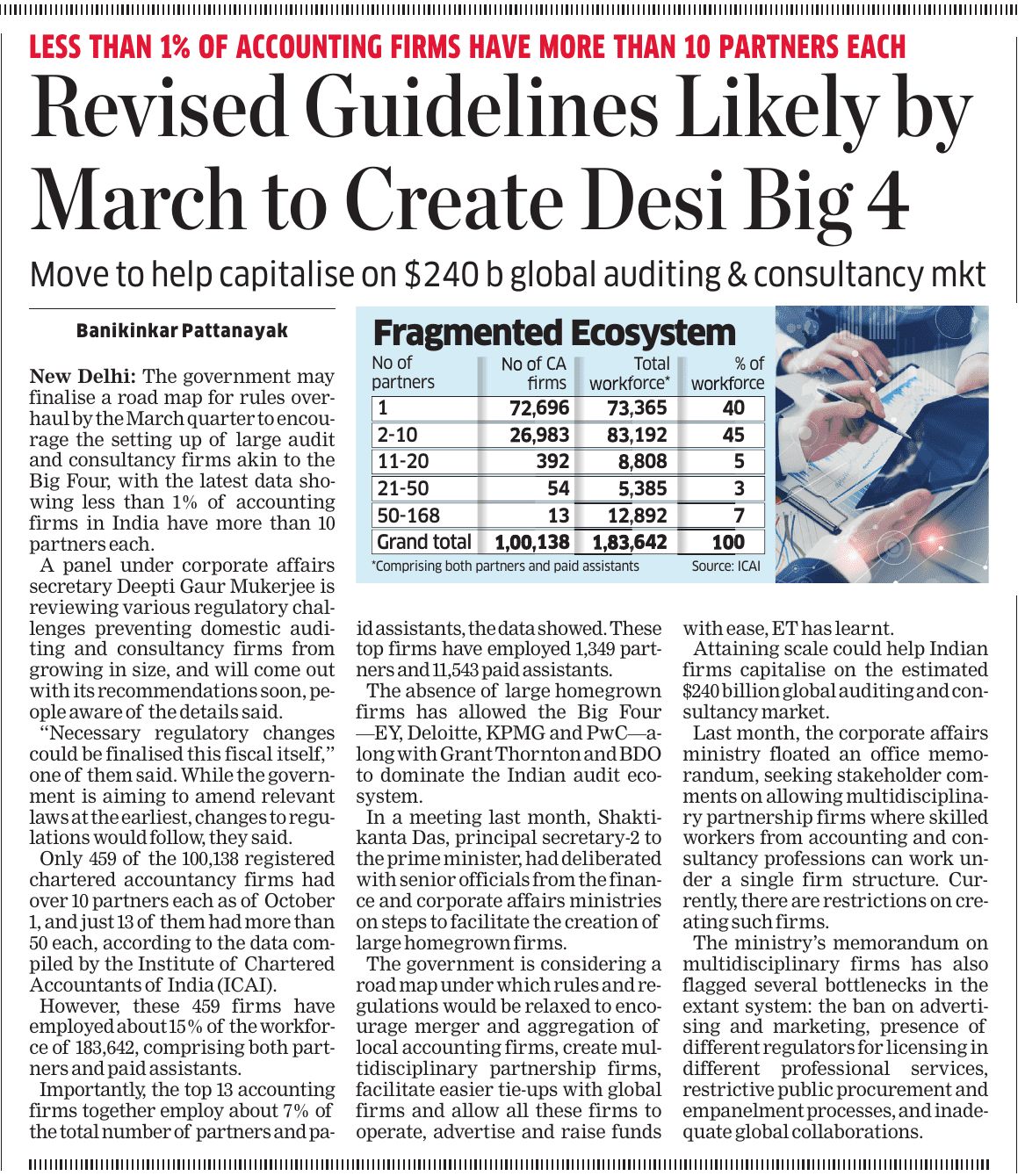Revised Govt Guidelines Likely by March to Build Desi Big 4
Page Contents
Less Than One % of Accounting Firms Have More Than ten Partners Each
Indian government’s plan to finalize revised guidelines by March to encourage the creation of large audit and consultancy firms, aiming to build a domestic equivalent of the global “Big Four” (EY, Deloitte, KPMG, PwC). The government is set to finalise reforms by March 2026 to promote the creation of large Indian audit and consultancy firms on par with the global Big Four.
A panel led by Corporate Affairs Secretary Deepti Gaur Mukerjee is reviewing regulatory barriers that prevent domestic firms from scaling up. With less than 1% of chartered accountancy firms having more than 10 partners, the government is considering measures to ease merger norms, enable multidisciplinary partnerships, and facilitate global tie-ups — helping Indian firms capture a share of the $240 billion global auditing and consulting market.
India may soon take a major step toward building its own “Desi Big 4.” A high-level panel led by Corporate Affairs Secretary Deepti Gaur Mukerjee is working to identify and remove regulatory hurdles that have kept Indian audit and consulting firms fragmented for decades.
Main Highlights finalize revised guidelines to encourage the creation of large audit & consultancy firms
Current Scenario: Less than 1% of accounting firms in India have more than 10 partners. The government is expected to finalize a roadmap by March 2026 to overhaul existing rules and encourage the creation of large Indian audit and consultancy firms, modeled on the global Big Four. According to data compiled by the Institute of Chartered Accountants of India, India currently has 1,00,138 registered chartered accountancy firms, but fewer than 1% have more than 10 partners. Fragmented Ecosystem:
-
- Firms with 1 partner: 72,695 firms (40% of workforce).
- Indian Firms with 2–10 partners: 26,983 firms (45% of workforce).
- Firms with 11–20 partners: 392 firms.
- Indian CA Firms with 21–50 partners: 54 firms.
- Firms with 51–168 partners: 13 firms.
- Total: 1,00,138 firms employing 1,83,642 people.
As per recent data, India has 1,00,138 registered accounting firms, but less than 1% have more than 10 partners.459 firms have 10+ partners. Only 13 firms have more than 50 partners, Nearly 40% are single-partner entities. This reflects how fragmented the ecosystem remains.
Regulatory Overhaul Underway
A committee headed by Corporate Affairs Secretary Deepti Gaur Mukerjee is reviewing regulatory bottlenecks that have constrained domestic firms from scaling up. Sources indicate that “necessary regulatory changes could be finalized this fiscal year itself.” The proposed roadmap includes:
- Encouraging mergers and aggregation among local firms.
- Enabling multidisciplinary partnerships that bring together professionals from accounting, law, and consulting backgrounds.
- Simplifying tie-ups with global firms.
- Allowing firms to advertise, raise funds, and operate more flexibly.
Aiming to Capture the $240 Billion Global Market
- Objective: Enable Indian firms to scale up and compete globally in the $240 billion auditing and consultancy market. In this case face Challenges like Regulatory hurdles prevent domestic firms from growing in size. A panel under corporate affairs secretary is reviewing rules to allow consolidation and expansion. This Could help Indian firms capture global opportunities and reduce dependency on foreign Big Four firms.
- India’s fragmented professional ecosystem has long been dominated by global networks such as EY, Deloitte, KPMG, and PwC, along with Grant Thornton and BDO. With supportive reforms, homegrown firms could finally achieve scale, global competitiveness, and brand identity, tapping into the $240 billion global auditing and consultancy market. Recently, Shaktikanta Das, Principal Secretary-II to the Prime Minister, convened a high-level meeting with officials from the Finance and Corporate Affairs Ministries to review measures for building large domestic audit networks.
- The day Indian talent is valued and rewarded at par with its global counterparts, we’ll see a true transformation. The same brilliant minds that have powered the growth of the global Big 4 for decades have the capability to build an Indian Big 4. It’s all about mindset, respect for homegrown expertise, and creating an ecosystem that empowers talent to lead not just contribute.
Govt Plans Reforms to Build Indian “Big 4” by March 2026
A panel led by Corporate Affairs Secretary Deepti Gaur Mukerjee is reviewing regulatory hurdles to help Indian audit and consultancy firms scale up. With fewer than 1% of CA firms having over 10 partners, reforms may include simplified merger rules, multidisciplinary partnerships, and global tie-ups, enabling Indian firms to compete in the $240 billion global market.
A counterpoint worth noting:
The absence of an Indian Big 4 may not be solely due to regulatory bottlenecks. the sector has historically been highly fragmented, and structural consolidation won’t come automatically from regulation alone. However, the recent policy and market developments may serve as a catalyst for collaboration among mid- & large-sized firms.
If we don’t move toward strategic alliances and consolidation, we risk being sidelined from large projects & policy-driven opportunities. With government preference and support for homegrown firms, the journey toward an Indian Big 4 is achievable but it will take collective will and vision from the profession itself.
Challenges Highlighted by the Ministry
The Corporate Affairs Ministry’s recent memorandum identifies key barriers to growth, including:
- Restrictions on advertising and marketing.
- Multiple regulators for different professional services.
- Fragmented licensing and empanelment processes.
- Limited global collaboration opportunities.
To address these, the Corporate Affairs Ministry’s has invited stakeholder feedback on permitting multidisciplinary partnerships, which could become a cornerstone reform for India’s professional services sector.
As discussions move toward policy finalization by March, the profession stands at an inflection point. With collaboration, regulatory support, and a shift in mindset, India could soon witness the rise of a homegrown “Desi Big 4” capable of leading global mandates, not just supporting them.

